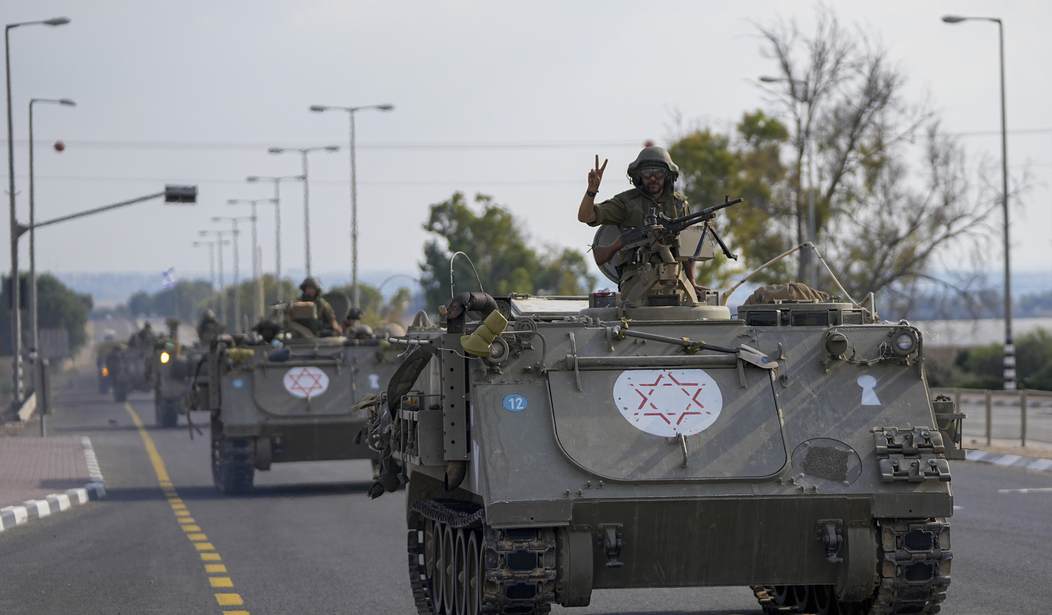Has Hamas’ hostage strategy paid off? Or has the Israeli public begun to consider the length and risk of a complete commitment to war in the Gaza traps that Hamas and Palestinian Islamic Jihad have set? A poll series conducted by the Israeli news outlet Maariv shows a sharp drop over the past week in support for a ground invasion at the present.
Now, nearly a majority wants to wait and see what happens instead:
Almost half of Israelis want to hold off on any invasion of Gaza, according to a poll published on Friday, in what may indicate a dip in support for the planned next stage of the counter-offensive against Hamas militants holding some 200 hostages. …
Asked if the military should immediately escalate to a large-scale ground offensive, 29% of Israelis agreed while 49% said “it would be better to wait” and 22% were undecided, the poll published in the Maariv newspaper said.
The daily said the results contrasted with its Oct. 19 poll that found 65% support for a major ground offensive.
Before this, the worry had been that a delay would give the West too much time to pressure Israel back into accepting the yoke of Hamas. That had a rational basis, as all sides are now admitting that the delay comes at least in part from US and EU pressure on two points: hostage negotiations (both US and EU) and asset deployment to deter escalation (mainly US). Perhaps not enough concern was given to the potential erosion of support for the next phase of a declared war on Hamas that could result from an extensive delay.
Does this reflect reality in Israel? We can quibble about the representative nature of polling and its limitations; the sample size is on the smallish side at 522 adults, with a 4.3% margin of error. However, that shift is clearly well outside of statistical noise. Israelis have gone from two-thirds support for a ground invasion to less than one-third support in the span of a week. That’s a massive shift, and it’s happening for some reason.
Maariv chalks it up to the release of a handful of hostages, and the ongoing negotiations in Qatar over the rest:
“From a breakdown of the answers, it emerges that there is no division in accordance with political camp or demographics, and that it is almost certain that the developments on the matter of the hostages, which is now topping the agenda, have had a great impact on this shift (in opinion),” Maariv wrote.
The concern over hostages is understandable, and not just among Israelis. There are apparently more than 50 Thai hostages among those captured, whose numbers have risen to 224. The Thais worked on the kibbutzes targeted by Hamas terrorists; at least one of the videos released in the aftermath of the invasion shows an attempted beheading of a Thai worker. Some Americans are also reportedly among them, and other nationalities as well. At least thirty of the hostages are children, adding to the moral weight of this issue.
The problem for Israel is that hostaging is strategic for Hamas, and it keeps paying off. The unity government in Jerusalem has been forced to shift its messaging in response to public pressure on this issue. At first, they declared that hostages would not deflect them from their strategic goal of victory through the destruction of Hamas, but now they are making hostage rescue their “supreme goal”:
In separate messages, the government and IDF said from the start that they wanted to return the hostages as well as eliminate Hamas.
However, in the early days of the war, a senior diplomatic official made it emphatically clear at that time that worrying about the hostages getting in the crossfire would in no way slow down the IDF’s attacks on Hamas. …
It is further unclear whether Gantz and the government’s belief that Israelis who have evacuated from the North and the South will wait patiently for an extende[d] delay of the invasion to return home or start to protest government policy.
Just before press time, Defense Minister Yoav Gallant similarly blurred the disparate goals of destroying Hamas and rescuing hostages, calling saving hostages a “supreme goal.”
The change in posture may have predated the poll results, but it’s clear now that the government saw the shift happening already.
The point about the dislocated populations is a valid concern too, especially in the southern area around Gaza. If the Israelis don’t root out Hamas and decisively defeat the Gazans in a way that discourages any further radicalism and war, those Israelis who survived the Hamas slaughter will never return to those kibbutzes. They had assumed that the IDF would keep them safe and that the government could manage the risk from Hamas, but that fantasy has been forever shattered. If Israel doesn’t prosecute this war to victory over Hamas, southern Israel will become a no-man’s land very quickly, and stay that way for a very long time.
Besides, what are the alternatives to a ground war to eliminate the existential threat Hamas poses? Apparently, the US is pressuring Qatar to either force Hamas to abandon Gaza or to lose access anywhere else:
The United States and Qatar have agreed to revisit the Persian Gulf state’s association with Hamas after resolution of the high-stakes international hostage crisis involving more than 220 people in Gaza, according to four diplomats familiar with the discussions.
The agreement, which has not been reported previously, was forged during a recent meeting in Doha between U.S. Secretary of State Antony Blinken and the emir of Qatar, Sheikh Tamim bin Hamad al-Thani. Still undecided is whether the reevaluation will entail an exodus of Hamas leaders from Qatar, where they have long maintained a political office in the capital, or steps that come short of that, these officials said, speaking on the condition of anonymity to discuss a sensitive matter. …
Since the cross-border attack, the Biden administration has adopted the Israeli government’s policy of likening Hamas to the Islamic State and pressured foreign governments and financial institutions to cut ties with the group, which has ruled the Gaza Strip since 2007. “There can be no more business as usual with Hamas,” Blinken said at a news conference in Qatar on Oct. 13.
The Treasury Department has launched a global campaign, imposing sanctions on Hamas members and financial facilitators in Algeria, Sudan, Turkey, Qatar and other places. The militant group receives economic and military support from Iran, Israel’s chief adversary.
But a zero-tolerance policy on Hamas associations threatens the delicate, ongoing hostage negotiations between the group and Qatar, talks that saw their first major breakthrough Friday with the release of two American women who had been abducted in the assault.
That’s another fatal delusion. Hamas will never willingly withdraw from any turf it controls. It’s doubtful that it would even go through a pretense of withdrawal for the sake of its allies, but any such agreement would be absurd. Hamas aims for the annihilation of Israel and the slaughter of Jews everywhere, and as the last 17 years have proven, have no interest in transforming itself for any other mission. Like ISIS, the only way to deal with Hamas is to destroy it. Eventually, Israel will either have to finish the war — either now or at some other time after more Israelis get butchered.
Update: Perhaps Israel’s government has decided to bring the ground invasion to a slow boil rather than a flash fire. In the last hour or so, the unity government announced that ground operations would “expand” tonight and tomorrow:
IDF ground troops are expanding their efforts inside Gaza to dismantle the Hamas terrorist infrastructure, IDF Spokesman Daniel Hagari said Friday evening …
“In the last few hours, we have severely increased our attacks in Gaza,” he said during an evening briefing, noting that attacks were taking place from the air, sea and land.
This sounds more like a slow-pace invasion, which given the years of preparation by Hamas, makes a lot of sense. It will make the war longer but more secure for the invading forces. They have already achieved one strategic goal today — taking out Hamas and Gaza communications:
UPDATE: A near total internet blackout has taken hold across much of Gaza, according to witnesses there and companies that monitor global connectivity. https://t.co/eLsXtGSA7y
— NBC News (@NBCNews) October 27, 2023
This may also be why the IDF conducted a briefing specifically about Hamas’ HQ in al-Shifa Hospital in Gaza City. The IDF has issued warnings specific to al-Shifa warning civilians not to shelter there since the beginning of the conflict. This time, they seem to be saying that whatever they have planned to take out Hamas is coming very very soon now.








Join the conversation as a VIP Member